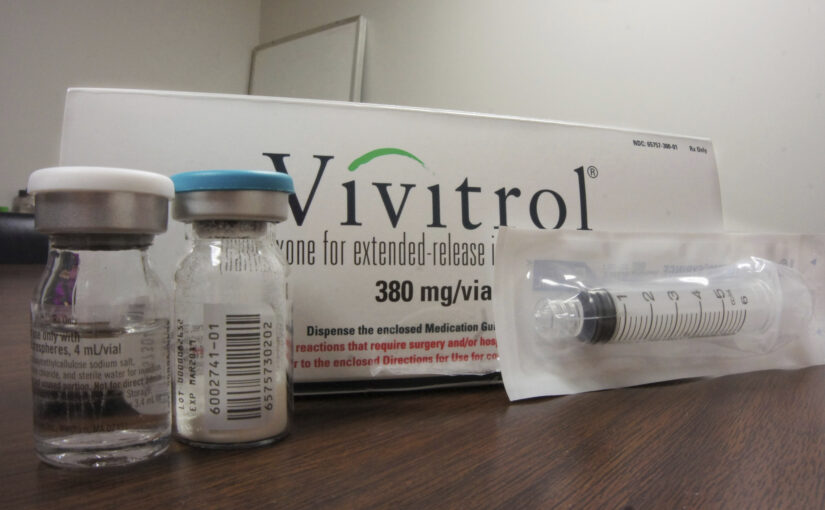Vivitrol treatment
Contents
Vivitrol works by blocking the effect that opioids have on the brain, and reduces the cravings that many people experience after they quit.
Physicians prescribe Vivitrol for patients who have already stopped drinking and using opioid drugs (such as morphine, heroin, and prescription pain medications) and who have gone through a detoxification process.
Vivitrol can be described as a medication which helps to stop relapses in patients suffering from opioid dependence. Since its first introduction, it provided a totally different approach to treat patients than its predecessors due to a variety of reasons. It eliminates any “high feeling” produced in the brain by drinking alcohol or opioids. Vivitrol can last for as long as 30 days after only one treatment. Contrary to almost all alternative, Vivitrol is completely non-addictive.
Being part of a group of substances known as opioid-antagonists Vivitrol is able to attach with the receptor for opioids but not producing dopamine. This blocks other substances from binding on the receptor. Vivitrol eliminates the feelings of euphoria triggered by the use of painkillers and heroin.
Vivitrol is given by a medical professional via shots. Similar to other treatments for addiction to chemicals Vivitrol is utilized as an element of a wider recovery program that is often a combination of individual and group therapy.
Effectiveness
Vivitrol is best used with a complete treatment program. Studies show it’s more effective than other medications that require daily dosages and placebo-controlled, double-blind clinical trials prove that Vivitrol prevents the relapse of addiction and decreases cravings for drugs.
FDA tests have shown that Vivitrol patients tend to be more likely to stay in treatment and not use illicit drugs. In addition, 36 percent were able to continue treatment for all six months without taking drugs, compared to 23 percent of the group of placebo.
Vivitrol Vs. Other medications
Vivitrol is the very first non-narcotic and non-addictive extended-release medicine approved for treatment of dependence on opioids. Buprenorphine and methadone, both approved to be used in the treatment of addiction to opioids are dangerous. Methadone is only available through specialist clinics. Buprenorphine can be accessible in doctor’s offices, but methadone and buprenorphine need daily dosages.
Side Effects
According to the FDA, side effects of Vivitrol during trial studies include:
- Dizziness
- Headache
- Muscle cramps
- Nausea and vomiting
- Painful joints
- Tiredness
Other potentially serious side effects of Vivitrol include:
- Allergic reactions, such as hives, rashes, facial swelling
- Feeling depressed7
- Liver damage
- Pneumonia
- Reactions at the injection site, which can be severe and may require surgical intervention
- Suicide, suicidal thoughts, and suicidal behavior
Alkermes, the drug’s manufacturer, claims the main side effects are:
- Increased liver enzymes
- Inflammation of nasal passages
- Insomnia
Vivitrol for alcohol addiction
The FDA first approved Vivitrol in 2006 for treatment of addiction. Naltrexone helps to reduce cravings to drink by introducing relapse prevention drugs like diulfira. Vivitrol can aid recovery from alcoholism in many ways. A study of two-year-olds who used Vivitrol for treating alcoholism found the effects of the treatment on alcoholism in the first two years after receiving treatment.
What other drugs affect Vivitrol?
Other drugs can be involved in naltrexone, like prescription medicines and prescription drugs. Tell your physician all your medication currently used.
What foods and drugs should I stay clear of while I am taking Naltrexone (Vivitrol)?

Do not take heroin, opioids, or any other street drug while you are taking the naltrexone. Never attempt to combat these effects using massive dosages of opioids. This could lead to dangerous effects, such as an insufficiency.
Talk to your physician prior to using any medicine to treat diarrhea, cough, cold or to treat pain. Some of these medicines contain opioids, and they may not be effective if you’re taking the naltrexone.
Naltrexone can impair your thinking or reaction. Be aware when you drive or perform things that require you to be vigilant.
According to the Substance Abuse and Mental Health Administration ( SAMHSA ), “Naltrexone blocks the euphoric and sedative effects of opioids such as heroin, morphine, and codeine” and “binds to the endorphin receptors in the body, [blocking] the effects and feelings of alcohol.”
Alcohol dependence

Vivitrol is used as part of a treatment program for drug or alcohol dependence. Vivitrol is used to prevent relapse in people who became dependent on opioid medicine and then stopped using it.
This form of treatment is not right for everyone. Side effects include risk of opioid overdose and injection site reactions. Although alcohol use disorder patients typically take Vivitrol in pill form, it is also possible for some of these patients to opt for monthly injections
medication was officially approved in 2010 by the Food and Drug Administration for the prevention of relapse to opioid dependence. It works by binding to opioid receptors in the brain for up to a one-month duration. It is currently the only approved medication for opioid dependence that is not a controlled substance.
Opioid dependence
VIVITROL Another evidence-based medication for opioid use disorder is naltrexone, an opioid antagonist formulated as an extended-release once-a-month injection (referred to here as the brand name Vivitrol). This medication is delivered once every 4 weeks, instead of everyday.
Vivitrol can be part of a treatment plan to treat alcohol and opioid addiction. Vivitrol is not a cure for addiction but can be helpful for your addiction treatment.
Vivitrol injections
Vivitrol injections are administered by a healthcare professional about once a month. Self-administration is not an option. This form of treatment is not right for everyone. Side effects include risk of opioid overdose and injection site reactions.
You will need to have completely stopped opioid use for at least 7-14 days prior to your first Vivitrol injection. You may need to complete medically supervised withdrawal (also known as opioid detox) before beginning your Vivitrol regimen. Vivitrol injections are administered by a healthcare professional about once a month.

